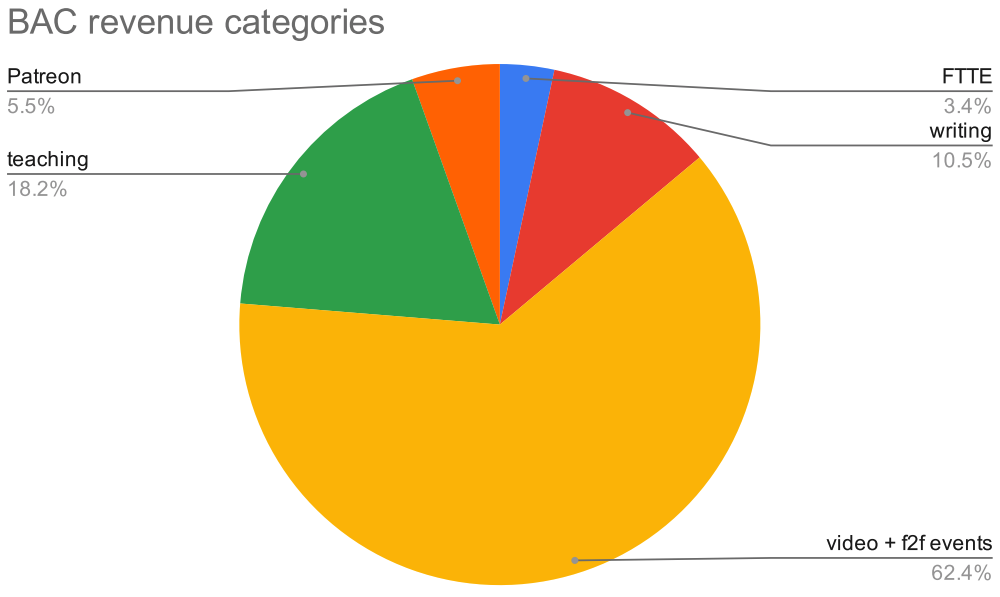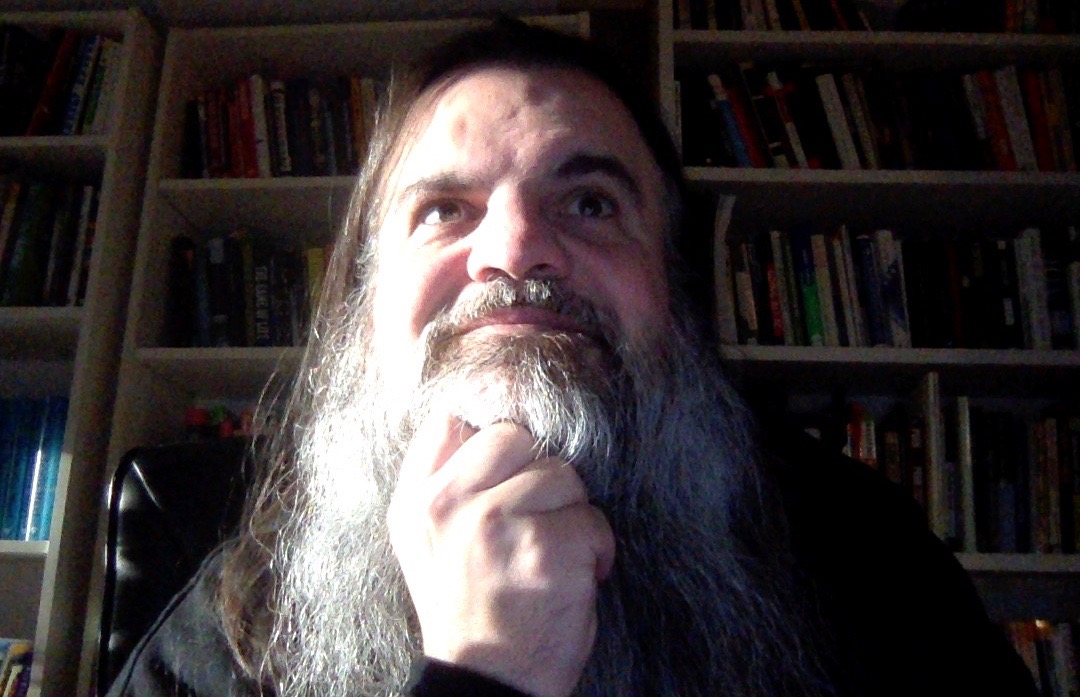Seven years ago Ceredwyn and I launched Bryan Alexander Consulting. From the start we’ve been open about the practice, sharing our plans, operations, strategies, and questions with you all.* Now it’s time for an update.
 If you’re new to BAC, it’s a small consultancy focused on the future of higher education. We help clients (colleges, universities, associations, nonprofits, governments, businesses) grapple with where academia might be headed. To this end we conduct and share research through a variety of channels, while also offering consulting on spec.
If you’re new to BAC, it’s a small consultancy focused on the future of higher education. We help clients (colleges, universities, associations, nonprofits, governments, businesses) grapple with where academia might be headed. To this end we conduct and share research through a variety of channels, while also offering consulting on spec.
2019-2020 has been a wild year. The first part, from June 2019-February 2020, proceeded pretty much along the lines we expected from the previous year. I conducted and shared research in person through speeches, presentations, workshops, and consultations across the United States plus Europe. That research appeared as well in the FTTE report. I honed the research by blogging (here) and also by sharing questions and thoughts across various social media platforms. Meanwhile, I taught graduate classes at Georgetown University: one in the summer, two in the fall, and one in spring.
Financially, BAC’s revenues came mostly from speaking and consulting engagements, followed by teaching, some online work, FTTE subscription, then Patreon support and book royalties. In 2019 the balance looked roughly like this:
In January 2020 my newest book, Academia Next, appeared. Sales were brisk (thank you, readers!) but royalties aren’t scheduled to reach BAC operations until next fiscal year, so I’m leaving them off of this post.
In February we passed a Future Trends Forum milestone of four years of continuous programming. The Forum is and always has been free to all. It is not a revenue generator.
Meanwhile, FTTE and Patreon subscriptions were ticking upwards in January and February of 2020.
Things were humming along. Living in the Washington, DC area made a huge difference, especially in terms of bandwidth (yes!), travel, and access to all kinds of organizations and people.
Then COVID-19 struck the world.
And everything went up in the air.
Like most other organizations, BAC was hit hard.
In April I continued this open practice by sharing how BAC was grappling with the shock then. Let me expand on that and update you.
To begin with, my face-to-face work evaporated in a couple of weeks. Nearly every single speaking gig, consult, and workshop went away as organizations canceled in-person events. A handful shifted online but at very reduced rates. My several-times-a-month drives to Dulles, National, Union Station, or points north shuddered to a stop.
I’m not sure if folks fully understand what an attack on BAC that was. Unless we changed things up drastically and fast, that was a death blow to the business.
At the same time BAC suffered from a weakness. We are very small, a literally mom and pop outfit. In the United States it is the giant enterprises that tend to survive COVID-19, while the smaller ones – lacking scale and reserves – go under. Remember, too, that we are independent. No institution backs us. No deep pocketed supporters or generous family members here. We’re on our own without a net.
So in the face of that extinction event we thought hard and pivoted, as they say. We made two decisions.
First, to make COVID-19 the top research priority. I already was paying attention, both as a forecaster and by tracking it starting when the virus first surfaced in Hubei province. In March I made it the leading topic. I set up a research strategy and pursued it consistently. I shared everything I found, trying to improve the quality of discussion while also getting feedback to improve the research. Soon I moved to producing futures work for higher education during the pandemic. I threw myself into creating the first major documentation of higher education’s shutdown in March.
Note that none of that work paid anything.
Indeed, it was a lot of time to expend during a business collapse. But it was vital to do that work. People in the higher education space needed it very much. And I couldn’t do my non-pandemic work without taking into account COVID’s impact.
Second, if face-to-face was done for the short term, we’d leap entirely online. So in a matter of weeks we built an online business based on live video events, or webinars. At no point did I stop working or go into a planning retreat; this was all done on the fly, the proverbial aircraft built in mid-flight. This strategy rested on the years of practice and reputation I’ve accumulated in hosting events. I reached out to potential partners of all kinds: friends, journalists, campuses, businesses, governments, nonprofits. I rebooted the Forum’s scheduled programming in favor of a COVID emergency topic, hauling in the best guests I could find for months.
In March and April I offered up to eight video events per week, mostly gratis, using just about every video platform I’ve heard of.
The intent was to convene conversations about the extraordinary transformation academia was undergoing, and also to demonstrate it was possible to do so in a way that didn’t narcotize audiences. And it was to prove to prospective clients that BAC had that capacity.
After a frantic few weeks positive results gradually started to trickle in, even as discontent over bad videoconfencing rose worldwide. Several organizations partnered with me so that we could offer events together. Each partnership differed in some ways, as in who would handle registration, which technology to use, or how to craft and host recordings. Overall, each one worked, yielding successful events and satisfied clients.
Since that manic spring hosting video events has become a key part of the business. Apparently we’ve proven that we can do this well.
Meanwhile, on another front, several entities approached me to write for them. Articles, white papers, research work – the forms differed, but the practice was similar at root. None required in-person meetings. This represents another service BAC provides, one we’ve offered previously, but is now picking up.
To sum up: right now, in June 2020, BAC is essentially a virtual business. Our offerings are digital, either synchronous (webinars), asynchronous (writing), or combinations thereof (teaching).
Taken together, here’s how 2019-2020 worked in terms of revenue, combining pre-pandemic and viral times:

You can see the growth of video, although it’s combined with f2f. Writing is significant, as is teaching. Patreon still isn’t there yet.
At the same time business expenses remained about the same as 2018-2019. Thankfully we didn’t face any medical or other household emergencies. Being under lockdown paid off on all measures.
What do we anticipate for BAC in 2020-2021?
More virtual events are in order. I’m reaching out to more prospective partners. I may also hold some special webinar events on key topics; I’m not sure if those will be free or accessible for a fee.
I also hope to buttress this part of the business with an ebook on webinars. I really hope we can keep this service going.
I hope to keep teaching at Georgetown, because I love it.

We have some overdue items. Lots of web work needs to be done, including refreshing the BAC website, upgrading the FTTE site, and launching a real Future Trends Forum site. The long-promised podcast is in preproduction now, so hopefully we can finally get it off the ground.
Three last notes.
First, seven years! BAC is nearing a decade in age. That’s a bit breathtaking to think of. It’s longer than I spent doing a PhD. Longer than I’ve had with some other jobs. And June 2013 was… a very different time.
Second, we make this work by working with great clients. We are grateful for the partnership of each and every one.
Third, if you like this work, and you like the openness with which we conduct it, please consider supporting us. Engage BAC for our services. Subscribe to FTTE. Support us on Patreon. As an independent futuring group in chaotic times, we cannot do this alone.
*Previous BAC reflections can be found here: 2019, 2018, 2017, 2016, 2016, 2015, 2014, 2013.






Thanks for the update Bryan, I appreciate the work you do and your willingness to join our webinar right at the beginning of shelter in place. We will be sure to send any work we can your way!
So, ah, who is your CPA/accountant?
Did you apply for a PPP loan and/or EIDL grants?
Thank you so much Bryan! It is passionate educators like you that give the little ones like me hope that there is meaning and purpose in the work we do,
I am appauled by your level of transparency and openness with your readers. But it also helps everyone fathom how much of hardwork is going on behind that Calm broad smile you always carry! Thank you.
Me and my venture faced a similar blow and we relocated to Russia – which is where my wife is from and we are landing on some F2F clients here. It is also helping us build a better international image in my home country Sri Lanka.
I stumbledupon your work through a WSJ article! I look forward to follow your work and contribute towards what you do in whatever little ways possible.
THANK YOU! GOD BLESS YOU! 🙂
My dear Arqi-ologist, thank you so much for your very kind words.
I deeply appreciate them.